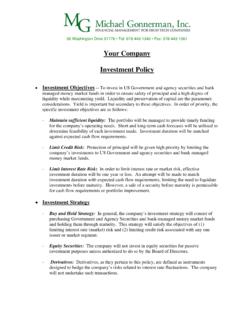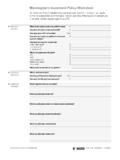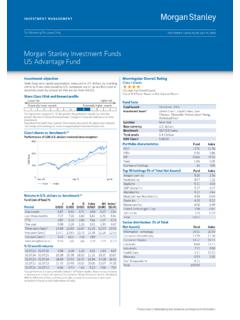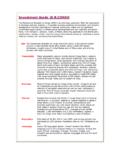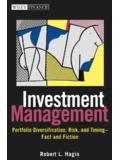Transcription of Real Estate Investment Newsletter – March 2003
1 real Estate Investment Newsletter March 2003 . Triple Net Lease Properties: Pro's and Con's A triple-net lease (NNN) property refers to a commercial building with one or more long-term (10-20 years) leases whose terms require the tenant to pay all expenses of the property. In other words: 1) Net of operating costs (maintenance, repairs, utilities, etc.), 2) Net of insurance, and 3) Net of property taxes. Some of these even make the tenant responsible for structural repairs. These are referred to as absolute triple-net leases. These will only apply to single tenant properties. In the rest of this article, we will focus on single tenant properties since these are the most common NNN investments for individual investors.
2 These properties are usually low risk. Cash flows are predictable and valuations are lower relative to apartments. Disadvantages include less tax shelter from depreciation, less upside from rapid rent rises, and sometimes re-leasing risk. You can find such investments as small as $300,000. The larger ones are priced in the millions, though its much more typical to find properties in the $900,000 - $1,600,000 range. The equity required would normally be 22-27%, though you might put up as little as 12% for a credit tenant deal (where the tenant is an Investment grade corporate). A single tenant property with a triple-net lease requires very little management.
3 There are no expenses to manage, no units to re-rent, no tenant complaints to deal with. Management consists of bookkeeping, tax returns, and deciding when to refinance or exchange the property. This makes these properties ideal for absentee owners since there is no risk that local management will mismanage the property (or manage it for their own benefit). The risks inherent in these properties are very easy to analyze. First, evaluate the credit worthiness of the tenant to determine the likelihood of a Berkeley Investment Advisors real Estate Investment Newsletter March 2003 . default on the lease. If default is a possibility, or if the lease term is short enough that you may hold the property through termination, you evaluate the location and the local commercial market rents and vacancies: determine how long it would take to re-lease the property and whether the new rent would be adequate.
4 For example, I recently looked at a NNN deal in Fontana California . near Los Angeles. The tenant was a small private chain restaurant with un- audited financial statements. Such a private entity automatically entails increased risk relative to larger companies that have audited financial statements. A visit to the restaurant revealed that business was rather slow despite the excellent location on historic route 66. Further investigation revealed that contractual rent was 25% above market. Thus there was significant risk in the projected cash flows (based on the lease). The tenant seemed shaky and, although the property would be easy to re-rent, the rent would have to be reduced significantly in the event of default.
5 On the other hand, a Walgreens drug store in almost any populated area, with a long-term lease guaranteed by the corporation, provides very predictable cash flows with very little risk. Relative to apartment buildings, NNN property valuations are much more reasonable. By this I mean that capitalization rates (the gross cash yield on the property) tend to run higher than apartments of comparable price in the same geographic market. The higher the capitalization (Cap) rate, the more leverage the property can support. For example, at a Cap rate of 6% a bank would only provide financing for 65%. of value, whereas at a Cap rate of you might find leverage as high as 80%.
6 Alternatively, a higher Cap rate means higher free cash flow for a given size mortgage. Either way, the result is lesser dependence on high appreciation to meet return objectives, and therefore less risk of missed expectations. Some of the cash flow advantage of triple-net lease properties may, however, end up being paid to the government for income taxes. As commercial properties, they must be depreciated (for tax purposes) over 39 years as compared to 27 years for apartment buildings. Thus the tax shelter provided by this non-cash expense is 30% lower. This disadvantage may, however, be irrelevant if the property's cash flow can be sheltered by 1) higher interest deductions (from a larger mortgage relative to value), or 2) excess depreciation from a complimentary apartment Investment .
7 Besides the taxation disadvantage, these properties will typically have less potential for rapid appreciation than properties, such as apartments, that 2. Berkeley Investment Advisors real Estate Investment Newsletter March 2003 . have shorter lease terms. Shorter lease terms provide the flexibility for rents to rise with the market (or fall with the market). For properties leased long- term under triple-net leases, rent rises are limited during the lease term . usually to the inflation rate or less. Thus the benefit of rising rents in an area will not be realized until the term of the lease, along with any non-market renewal options, has ended.
8 Such distant benefits are discounted heavily in the real Estate market; they have little impact on current value. Therefore, appreciation on these properties is unlikely to exceed the rate of rent escalations until the end of the lease term draws near. For a single tenant commercial property, the end of the lease term can have a large impact on value and risk. Commercial properties can be more difficult, and take longer, to re-lease than residential properties. Consequently, they may be harder to finance (and sell) near the termination date if the local leasing market is weak. On the other hand, the opportunity to re-lease at a significant rent increase in a strong market can provide a big boost in value.
9 Obviously a long-term vacancy in a single tenant property can be a financial disaster for an investor with limited liquidity. As a result, NNN properties with short times left on existing leases should only be considered by investors with good liquidity who are willing to take on this additional risk. An investor taking on re-leasing risk successfully may reap substantial rewards over and above the typical returns for NNN properties. Conclusion The advantages of NNN properties outweigh the disadvantages for many investors and the disadvantages may often be mitigated (appropriate tax strategies, buying in a strong commercial market). For some investors the potential for higher returns may justify the additional risks for those properties with short lease terms.
10 Overall, NNN properties are excellent starter investments for investors who want to own property but want to start with a low risk, low management property. Credit tenant NNN deals are essentially inflation-protected bonds with ironclad principal guarantees . they are an excellent choice for those who prefer safety but are willing to give up some liquidity for a significant boost in returns. In order to take advantage of the opportunities available in this market, you need good up-front due-diligence and a clearly thought out strategy if you wish to pursue higher returns by buying properties near the end of a lease term. Berkeley Investment Advisors can help find the right deal for you and explain the advantages and disadvantages of the various properties available.

